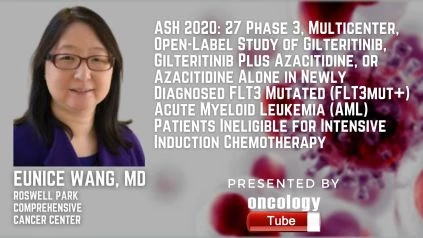Eunice S. Wang, MD of Roswell Park Comprehensive Cancer Center discusses the ASH 2020 abstract – 27 Phase 3, Multicenter, Open-Label Study of Gilteritinib, Gilteritinib Plus Azacitidine, or Azacitidine Alone in Newly Diagnosed FLT3 Mutated (FLT3mut+) Acute Myeloid Leukemia (AML) Patients Ineligible for Intensive Induction Chemotherapy.
Context:
In patients with FLT3-mutated (FLT3mut+) relapsed/refractory acute myeloid leukemia (AML), including internal tandem duplication (ITD) and tyrosine kinase domain (TKD) mutations, Gilteritinib is an oral FMS-like tyrosine kinase 3 (FLT3) inhibitor that has demonstrated efficacy with favorable tolerability. Tumor growth and induced apoptosis and differentiation of FLT3 ITD AML cell lines and patient blasts in vitro were inhibited by combining FLT3 inhibition with azacitidine (AZA). Furthermore, in murine AML xenograft models with FLT3 ITD, the combination of gilteritinib with AZA showed synergy over either treatment alone. An ongoing, open-label, phase 3, randomized trial investigating gilteritinib plus AZA vs AZA alone in newly diagnosed (ND) FLT3mut+ AML adults who were unable to undergo intensive induction chemotherapy is identified (NCT02752035).
Methodology:
This research involves ND FLT3mut+ (ITD or TKD [D835/I836]) AML patients who are (a) ⇠65 years old and considered ineligible by the investigator for intensive induction chemotherapy, or (b) ⇠18-64 years old with unique comorbidities that cause intensive induction chemotherapy ineligibility. The study started with a Safety Cohort in which patients received 80 mg/d of oral gilteritinib as the initial dose on days 1 to 28 (or 120 mg/d as the next dose level) plus 75 mg/m2/d of AZA on days 1 to 7. A randomization cohort was followed where ~250 patients are expected to be randomized 2:1 to receive oral gilteritinib on Days 1-28 plus AZA 75 mg/m2/d SC/IV on Days 1-7 (Arm AC) or AZA alone, given in 28-day cycles (Arm C) until there is a lack of efficacy, inappropriate toxicity, or a discontinuation case. A gilteritinib-alone treatment arm (Arm A) that was withdrawn was included in an earlier protocol version. The key endpoint is absolute survival (OS). Event-free survival (EFS; primary secondary endpoint), best response, remission rates (complete remission [CR], incomplete hematologic recovery [CRi], partial hematologic remission [CRp], composite CR [CRc; a total of CR, CRi, and CRp]) and duration, transfusion and maintenance rates, leukemia-free survival, patient-reported fatigue, and protection and safety are secondary endpoints. When ~70 and 140 deaths are observed, respectively, one interim and one final review are scheduled. Using the stratified log-rank test, OS and EFS will be evaluated with age strata ( ⇠75 vs <75 years), cytogenetic risk (favorable or intermediate vs unfavorable or secondary AML) and FLT3 mutation status (low allelic ratio FLT3 TKD vs FLT3 ITD [<0.5] vs FLT3 ITD high allelic ratio [ ⇠0.5]).
Outcomes:
Table 1 describes the features of all patients involved in the Protection and Randomization Cohorts as of 29 June 2020. Fifteen patients were enrolled in the Protection Cohort. 14 patients died and 1 patient failed to undergo care (Figure). The median period of treatment (range) was 6 cycles (<1–34); 40 percent (n=6/15) received >12 treatment cycles. A CRc of 67 percent (n=10/15) was observed overall (Figure). Based on these results, for the Randomization Cohort, a 120 mg daily dose of gilteritinib plus AZA was adopted. As of 29 June 2020, 136 patients were randomized, 114 in Arm AC or C and 22 in Arm A, respectively (now closed). The median (range) period of treatment was 4 (<1–31) cycles, with ~6 treatment cycles being received by 40 percent (n=54/136). A total of 83 (61 percent) patients died in the Randomization Cohort.
Findings:
The research is continuing and no new safety signals have been found to date associated with gilteritinib 120 mg daily plus AZA in the study. The Safety Cohort of gilteritinib 80-120 mg plus AZA shows a CRc rate of 67 percent in mature remission results. In patients with ND FLT3mut+, AML found unfit for intensive chemotherapy, gilteritinib 120 mg/d plus AZA vs AZA alone continues to be randomized to receive 2:1 for initial treatment.

